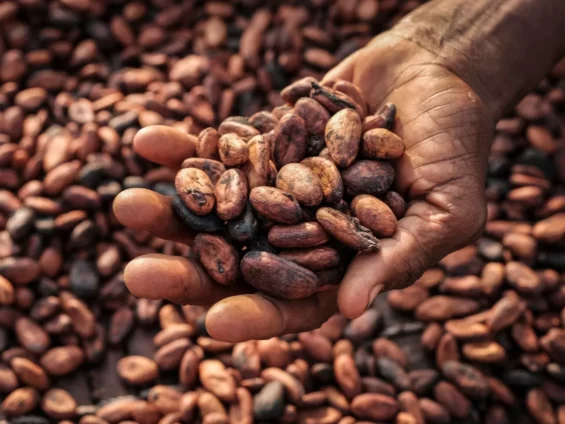The Ghana Cocoa Board (COCOBOD) has invested almost a billion cedis last year to rehabilitate aged cocoa farms and those ravaged by swollen shoot diseases to help increase national production in the short to medium term.
The amount adds to similar spending in previous years to replace farms attacked by the virus, leading to reduced cocoa production in recent years.
The Chief Executive Officer of COCOBOD, Joseph Boahen Aidoo, said in an interview that the initiative was part of efforts to sustain cocoa production and the livelihoods of farmers.
He was, therefore, confident that the country would produce more than 800,000 metric tons of cocoa in the 2024/25 season that opens in September.
The CEO and his deputy in charge of Finance and Administration, Ray Ankrah, were reacting to media reports that COCOBOD’s administrative expenses rose to GH¢3.4 billion last year when cocoa production fell.
Mr. Aidoo said the money was used to fund the cutting down of diseased and aged farms, nurse, and plant seedlings as well as maintain the rehabilitated farms before handing them over to farmers across the country.
He said this strategic investment in farmers and farms led to the board’s administrative cost increasing to GH¢3.4 billion in 2023.
Therefore, Mr Aidoo said it was misleading for people to suggest that COCOBOD spent GH¢3.4 billion at its head office last year when a chunk of the funds was used to support cocoa production and the welfare of the crop farmers.
Finance angle
The Deputy CEO in charge of Finance and Administration said the misleading report was in spite of a detailed explanation provided in the board’s audited accounts.
“I think it’s deliberate to cause public disaffection because our audited accounts and the Auditor General’s report as captured in the 2023 financials show clearly that, included in the administrative cost is a GH¢943 million expense incurred on our productivity enhancement programmes (PEPs).”
“The GH¢943 million was actually used to rehabilitate diseased and moribund farms to sustain the livelihood of the affected farmers and increase cocoa production, starting with the 2024/25 season,” Mr Ankrah said.
He explained that but for that one-off expenditure, which he said was funded from a loan secured from the African Development Bank (AfDB), the administrative cost actually reduced in 2023.
Sustaining production
A non-curable disease, the swollen shoot virus disease (CSSVD) reduces yields of cocoa trees before killing them. Data show that a large portion of Ghana’s total cocoa farmlands are either moribund or affected by the disease, partly contributing to reduced production.
COCOBOD’s CEO said people needed to understand that rehabilitation of cocoa farms was a necessity to sustain the sector and the livelihoods of the crop farmers.
He said that but for such a drastic yet visionary effort, the country’s cocoa-productive land area would shrink, leading to reduced yields with all the attendant benefits derived from cocoa.
Mr Aidoo noted that COCOBOD was working tirelessly to revive cocoa production after extreme weather conditions, technically called El Nino effect, affected the country’s cocoa sector, leading to a decline in output.
He said some of the rehabilitated farms would start contributing to national output next season, resulting in increased production.
Inputs
Mr Aidoo assured farmers of an adequate and timely supply of inputs next season to facilitate farmers’ work for increased production.
He said COCOBOD was keen on making it easier and comfortable for farmers to produce cocoa and would, therefore, invest appropriately to reduce the challenges impeding the work.
He mentioned the board’s hand pollination, pruning and irrigation schemes as some of the efforts used to increase production.
He said these measures were also making cocoa farming more attractive to the youth, leading to more young people joining the venture.
Financial turnaround
On his part, COCOBOD’s Deputy CEO in charge of Finance and Administration said beyond working to raise output, the board was putting in place prudent measures to revive its fortunes, which, he said were ravaged by the effects of the COVID-19 pandemic.
He said COCOBOD’s return to profitability last year was clear evidence of that commitment.
The board’s audited accounts and the Auditor General’s 2023 report on public boards and corporations showed that COCOBOD made a GH¢2.3 billion profit last year compared to a GH¢4.2 billion loss in 2022.
The deputy CEO was confident that the turnaround would be sustained and improved to help strengthen COCOBOD’s ability to support farmers and the sector.
In concluding, the CEO assured farmers of better policies and programmes next season in line with the government’s commitment to improving farmers' livelihoods
Latest Stories
-
Ghana could reclaim $4 million from solar waste with proper recycling – KNUST Study finds
4 minutes -
Focus on electability, not endorsements – Political analyst warns NPP delegates
11 minutes -
Trump shares message from Nato chief praising ‘decisive action’ in Iran
17 minutes -
Water supply improves in Bongo town, but fluoride concerns persist
19 minutes -
New LI in the offing to make disability inclusion mandatory – Dr Apaak
20 minutes -
Endorsements don’t always equate to actual votes, says Bryan Acheampong’s camp
33 minutes -
University of Ghana issues COVID-19 resurgence alert
37 minutes -
Pastor accused of withdrawing cash from dead friend’s account faces court
43 minutes -
Concerned Small Scale Miners accuse gov’t of targeting, harassment, unlawful seizure of equipment
52 minutes -
Let the law be your compass: Kojo Oppong Nkrumah inspires future lawyers at KNUST Law Week
54 minutes -
Bryan Acheampong declares intent to contest NPP flagbearership position
1 hour -
ComUnity Spaces fosters business growth through networking
1 hour -
Ras Kuuku has been very supportive to me – Masaany
1 hour -
Inside the quiet meetings steering Ghana’s governance transformation
2 hours -
“The world has evolved” – Maya Blu on calls to stick to highlife
2 hours

